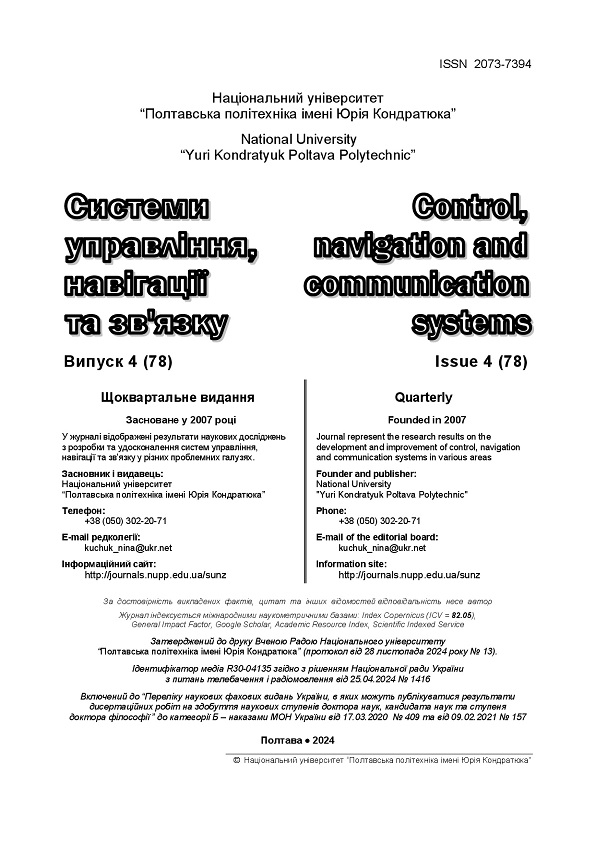BIO-INSPIRED OPTIMIZATION OF NON-BINARY LOW-DENSITY PARITY-CHECK CODES
DOI:
https://doi.org/10.26906/SUNZ.2024.4.223Keywords:
bio-inspired optimization, efficiency, low-density parity-check codes, non-binary codes, radio communication systemsAbstract
The paper proposes a bio-inspired approach to the optimization of non-binary low-density parity-check codes. At the first stage of the developed optimization method, the characteristics of information transmission and the parameters of the selected bio-inspired optimization procedure are set. The key stage of the method consists in iterative search of the parity-check matrix using the selected bio-inspired optimization procedure based on computer simulation. Modeling of the information transmission process is carried out for a given modulation method and selected parameters of the communication channel. The construction of sets of parity-check matrices of non-binary low-density parity-check codes is based on the progressive edge growth method. The evaluation of the performance of each generated parity-check matrix is used the calculation of the error rate based on the results of iterative belief propagation decoding. For the software implementation of the proposed approach, an algorithm of bio-inspired optimization of non-binary low-density parity-check codes has been developed. The presented method of optimizing these non-binary codes is advisable to use to improve the efficiency of new generation radio communication systems.Downloads
References
Aslam A. M., Chaudhary R., Bhardwaj A., Kumar N., Zeadally S. Metaverse for 6G and beyond: the next revolution and deployment challenges. IEEE Internet of Things Magazine. 2023. Vol. 6. No. 1. P. 32-39. https://doi.org/10.1109/IOTM.001.2200248.
Zhang H., Tong W. Channel coding for 6G extreme connectivity – requirements, capabilities, and fundamental tradeoffs. IEEE BITS the Information Theory Magazine. 2023. Vol. 3. No. 1. P. 54-66. https://doi.org/10.1109/MBITS.2023.3322978.
Geiselhart M., Krieg F., Clausius J., Tandler D., Ten Brink S. 6G: a welcome chance to unify channel coding? IEEE BITS the Information Theory Magazine. 2023. Vol. 3. No. 1. P. 67-80. https://doi.org/10.1109/MBITS.2023.3322974.
Noor-A-Rahim M., Liu Z., Guan Y. L., Hanzo L. Finite-length performance analysis of LDPC coded continuous phase modulation. IEEE Trans. on Vehicular Techn. 2020. Vol. 69. No. 10. P. 12277-12280. https://doi.org/10.1109/TVT.2020.3012727.
Vu H. D., Nguyen T. V., Nguyen D. N., Nguyen H. T. On design of protograph LDPC codes for large-scale MIMO systems. IEEE Access. 2020. Vol. 8. P. 46017-46029. https://doi.org/10.1109/ACCESS.2020.2979156.
Yang Z., Fang Y., Cai G., Zhang G., Chen P. Design and optimization of tail-biting spatially coupled protograph LDPC codes under shuffled belief-propagation decoding. IEEE Communications Letters. 2020. Vol. 24. No. 7. P. 1378-1382. https://doi.org/10.1109/LCOMM.2020.2985773.
Kwak H.-Y., Kim J.-W., Park H., No J.-S. Optimization of SC-LDPC codes for window decoding with target window sizes. IEEE Trans. on Communications. 2022. Vol. 70. No. 5. P. 2924-2938. https://doi.org/10.1109/TCOMM.2022.3158307.
Sariduman A., Pusane A. E., Taskin Z. C. On the construction of regular QC-LDPC codes with low error floor. IEEE Communications Letters. 2020. Vol. 24, No. 1. P. 25-28. https://doi.org/10.1109/LCOMM.2019.2953058.
Shtompel M., Prykhodko S., Shefer O., Halai V., Zakharchenko R., Topikha B. Performance analysis of the bioinspired method for optimizing irregular codes with a low density of parity checks. Eastern-European Journal of Enterprise Technologies. 2020. 6(9 (108)). P. 34-41. https://doi.org/10.15587/1729-4061.2020.216762.
Liu Q., Feng Z., Xu J., Zhang Z., Liu W., Ding H. Optimization of non-binary LDPC coded massive MIMO systems with partial mapping and REP detection. IEEE Access. 2022. Vol. 10. P. 17933-17945. https://doi.org/10.1109/ACCESS.2022.3147273.
Hareedy A., Lanka C., Guo N., Dolecek L. A combinatorial methodology for optimizing non-binary graph-based codes: theoretical analysis and applications in data storage. IEEE Transactions on Information Theory. 2019. Vol. 65. No. 4. P. 2128- 2154. https://doi.org/10.1109/TIT.2018.2870437.




